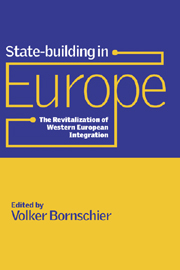Book contents
- Frontmatter
- Contents
- List of figures and tables
- List of contributors
- Preface
- Acknowledgements
- Part I State-building and Political Entrepreneurship
- Part II The Core Elements in Recasting the European Bargain
- Part III Conclusions beyond the Single European Act of 1986
- Appendix List of interview partners
- Bibliography
- Index
Part I - State-building and Political Entrepreneurship
Published online by Cambridge University Press: 10 October 2009
- Frontmatter
- Contents
- List of figures and tables
- List of contributors
- Preface
- Acknowledgements
- Part I State-building and Political Entrepreneurship
- Part II The Core Elements in Recasting the European Bargain
- Part III Conclusions beyond the Single European Act of 1986
- Appendix List of interview partners
- Bibliography
- Index
Summary
Western Europe's move toward political union in the middle of the 1980s took place after years of Eurosclerosis and its impact was only dimly perceived by most observers at the time. Chapter 1 by Volker Bornschier develops a novel explanation for this remarkable shift in Europe's political economy. In the context of the then fading lustre of the United States, the hegemon of the postwar era, and the seemingly limitless economic ascent of Japan, the path toward economic and political union represented Europe's attempt to remain a player in the post-hegemonic round of competition. The resurgence of economic globalization that started in the 1970s and a tighter closing of ranks by the European states are contradictory only at first glance. The first implies a shift in power between the state and the economy in favour of the transnational economy, to which regional integration is an answer, a new deployment of an old weapon by states. In the political world economy, first economic enterprises and then states compete with one another. On the other hand, economic enterprises and states are dependent on each other. The supply of state-based order and support as a locational condition and the demand for this by economic enterprises must be united in practice. Here, negotiations are the typical form of exchange. Chapter 1 suggests that the qualitative change of West European integration in the first half of the 1980s was the result of an alliance between European transnational corporations – represented by the European Roundtable of Industrialists – and the Commission. It is made very clear that this was the decisive impulse, the necessary condition to overcome Eurosclerosis.
- Type
- Chapter
- Information
- State-building in EuropeThe Revitalization of Western European Integration, pp. 1 - 2Publisher: Cambridge University PressPrint publication year: 2000



